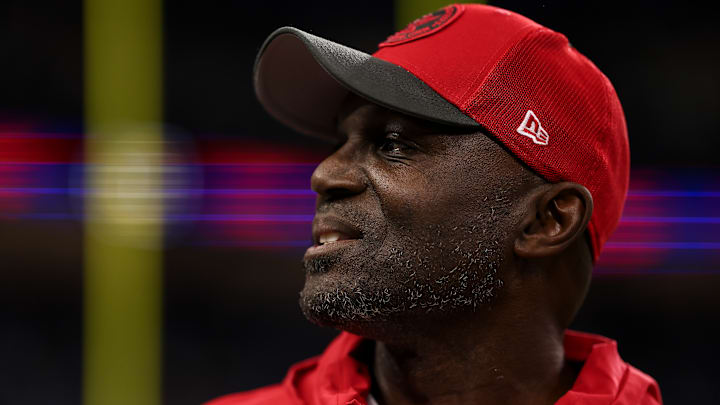With one timeout and 1:39 left on the clock, the Tampa Bay Buccaneers trailed the Detroit Lions, 31-23. With the pocket — and the Buccaneers season — collapsing, quarterback Baker Mayfield rushed a pass across the middle and was intercepted by Lions middle linebacker Derrick Barnes.
The Lions took possession at Tampa Bay's 28-yard line with 1:33 remaining. The Buccaneers still had one timeout remaining, so the game wasn't over yet — especially not for the Lions.
Lions quarterback Jared Goff took a knee on three consecutive snaps without draining the play clock between each play. On Detroit's last kneel-down, center Frank Ragnow snapped the ball with 14 seconds remaining on the play clock. When Goff took a knee for the third and final time, the congratulatory hugs and celebrations began. Yet, there were still 36 seconds remaining on the game clock and the Buccaneers still had one timeout left.
After the game, Lions head coach Dan Campbell was questioned about why the Lions didn't drain the play clock to prevent the Buccaneers from getting the ball back.
"Yeah, look, well, first of all, we didn't handle that whole thing well on our end," Campbell said about the early kneel-downs. "We should've bled it more than we did."
The Lions are no strangers to losing games in the most heartbreaking fashion possible. In Detroit, fans explained those heartbroken moments with one simple phrase: "Same Old Lions." The Same Old Lions always lost games in bewildering ways, and it would have gone something like this: The Buccaneers take a timeout with 36 seconds left on the clock. Instead of punting the ball back to Tampa Bay on fourth down, Lions head coach Dan Campbell sends out the field goal unit to make it a two-score game.
Here's the call that never was with no timeout being called: "Kicker Michael Badgley will look to make this a two-score game. The snap is good, the hold is good, Badgley's kick is... blocked! It's blocked by... Vita Vea! Vita Vea scoops up the ball! He's running down the sideline! Nobody will catch him! Touchdown, Buccaneers!"
But this Detroit team isn't anything like the Lions teams of yesteryear. Although Jared Goff did take a knee without exhausting the play clock, the Buccaneers never used their final timeout. The clock ticked down, and the game was over.
The bewildering case of Tampa Bay's unused timeout
The NFL is no stranger to last second miracles — The Immaculate Reception, The Holy Roller, The Minneapolis Miracle. There are so many ways a game can quickly turn upside down, whether it's a Hail Mary, a turnover, or a blocked kick.
If the Buccaneers used their final timeout, the Lions would have needed to either punt the ball or attempt a 49-yard field goal. In his NFL career, Badgley has missed 11 of 48 field goal attempts from 40-to-49 yards and he’s just 5-of-13 from 50-plus yards. If Badgley missed, the Buccaneers would have been at their own 39-yard line, needing a touchdown and a two-point conversion to tie the game. If the Lions elected to punt the ball, the Buccaneers could have attempted a Hail Mary.
Buccaneers head coach Todd Bowles explained the decision to not use a timeout on Monday.
"It's not a gentlemen's agreement," Bowles said. "They were in field goal range. We'd have had 12 seconds, calculated, after using that timeout to come back from it. Then we'd have been down 11 points, so it's kind of pointless. You kind of know when the game is over. The game was over."
"Yeah, we knew they had a timeout left, and I could tell [Bowles] wasn't going to call it," Campbell said. "And so, that's just — that's how it ended."
While it's easy to criticize Bowles for appearing to give up on the season by not using the timeout, the reality of the situation is that it wouldn't have changed the outcome. If Campbell could look across the sideline and tell Bowles wasn't going to use the timeout, then it didn't matter if the Lions kneeled the ball early in the play clock. If Bowles was going to use the timeout, Campbell likely would've made sure the offense exhausted the play clock on second and third down.
Still, it's interesting to wonder what would have happened if Bowles changed his mind after the final kneel-down and used his timeout.
